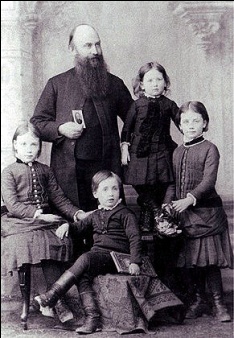|
Rev. William Hechler & Theodor Herzl
A Zionist debt fulfilled
By Jerry Klinger
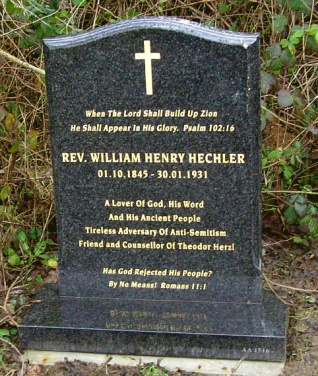
“He is an improbable figure when looked at through the quizzical eyes of a Viennese Jewish journalist. But I have to imagine that those who are antithetical to us in every way view him quite differently. So I am sending him to Berlin with the mental reservation that I am not his dupe if he merely wants to take a trip at my expense.
To be sure, I think I detect from certain signs that he is a believer in the prophets. He said, for example, “I have only one scruple: namely, that we must not contribute anything to the fulfillment of the prophecy. But even this scruple is dispelled, for you began your work without me and would complete it without me.”
On the other hand, if he only faked these signs which have made me believe in him, he will all the more be a fine instrument for my purposes.”
Diaries of Theodor Herzl - March 10, 1896
Theodor Herzl lay dying. He had bankrupted his family, ruined his marriage, ruined his relationships with his children and destroyed his health for Zionism and the Jewish people. He had given everything he could.
A somber, heartbroken man stood by Herzl’s bedside in the few hours before his death. He was the last non-family to be with Herzl before he would pass to God and eternity. Yet, without this clearly distraught mourner, Herzl might never have been anything more than an obscure, eccentric, minor Austrian newspaper columnist.
Herzl had asked the Zionist movement and the Jewish people not to forget the man standing by his deathbed. He had asked them not to forget all that this man of God had done for him, Zionism and the Jewish people. After Herzl’s death, Zionism and the Jewish people forgot the great debt owed to Rev. William Henry Hechler, the man Herzl termed the first Christian Zionist. Hechler was the man who made Herzl and Zionism legitimate in the eyes of the world and in the eyes of Jewry.
Hechler died 27 years after Herzl, January 30, 1931. He died alone, forgotten, nearly impoverished. A grave was dug for him in North London. He was buried without so much as a tombstone to say he even existed.
I discovered Hechler’s unmarked, overgrown gravesite last April. Herzl’s request rang in my ears. It was a wrong that I, as a Zionist and a Jew, had to make right.
William Henry Hechler was born, January 10, 1845, in the Hindu “Holy” city of Benares, India, to a German Anglican missionary father, Dietrich Hechler, and his English wife, Catherine Clive Palmer. William’s conservative education exposed him to Evangelical Restorationism. A central belief of Restorationism was that the “Second Coming of Jesus” would occur after the Jews were restored to Palestine. Hechler’s faith did not mandate that the Jews had to convert before Restoration. It did lead him to a sincere interest in the welfare of Jews, Jewish concerns and in Palestine. Deeply distressed by Tsarist oppression of the Jews in the 1880’s, Hechler traveled into the Russian Pale of Settlement. In Russia, he met Leon Pinsker, the author of the early Zionist tract, Auto-Emancipation, which called for Jewish national separatism as a solution to the Jewish problem. 1893, Hechler self published his own broadsheet, The Restoration of the Jews to Palestine according to the Prophecy. Hechler had projected that the days of the Jewish salvation would begin in 1897-1898.
Theodor Herzl had published his, what was little more than an oversized booklet, The Judenstadt, the Jewish State, in February of 1896. He called for a solution to anti-Semitism and the millennia old Jewish problem. Those Jews, who wished, should have the opportunity to normalize their lives by establishing a Jewish homeland separate from the Nations that did not want them. His idea was not new or unique. It had been outlined by Christians and Jews before Herzl.
Herzl’s book threatened the Jews in the Western Europe struggling to firmly establish their recently won political emancipation. They largely rejected Herzl as a crank and a problem. The Jews in Eastern Europe barely heard the clarion at first. For that matter, Herzl hardly knew of Eastern European Jews. He almost certainly did not know Sephardic Jews in Arab countries existed.
Herzl, in the beginning, did not believe that a Jewish State could be established by poor, ignorant, superstitious Jewish masses. He believed that a Jewish State could be brought to life by fiat of wealthy Jews together with the world powers of Europe. He had no realistic clue how to do it. The Jewish powerful, from the Rothschilds on, had thrown him out. He had no idea how to get to the European heads of state.
The catalyst for Herzl’s success did not come from the Jews. It came from a Christian.
March 10, 1896, Herzl recorded in his meticulously kept diary his “first” meeting with Reverend Hechler.
“The Rev. William H. Hechler, chaplain to the British Embassy in Vienna, called on me.
A likeable, sensitive man with the long grey beard of a prophet. He waxed enthusiastic over my solution. He, too, regard my movement as a “prophetic crisis” – one he foretold two years ago. For he had calculated in accordance with a prophecy dating from Omar’s reign (637-638) that after 42 prophetical months, that is, 1,260 years, Palestine would be restored to the Jews. This would make it 1897-1898.
When he read my book, he immediately hurried to Ambassador Monson (British Ambassador in Vienna) and told him: the fore-ordained movement is here!
Hechler declares my movement to be a “Biblical” one, even though I proceed rationally in all points.
He wants to place my tract in the hands of some German princes. He used to be a tutor in the household of the Grand Duke of Baden, he knows the German Kaiser and thinks he can get me an audience.”
Less than a week later, Herzl went to see Hechler.
“Yesterday, Sunday afternoon, I visited the Rev. Hechler. Next to Colonel Goldsmid, he is the most unusual person I have met in this movement so far. He lives on the fourth floor; his windows overlook the Schillerplatz. Even while I was going up the stairs I heard the sound of an organ. The room which I entered was lined with books on every side, floor to ceiling.
Nothing but Bibles.
A window of the very bright room was open, letting in the cool spring air, and Mr. Hechler showed me his Biblical treasures. Then he spread out before me his chart of comparative history, and finally a map of Palestine. It is a large military staff map in four sheets which, when laid out, covered the entire floor.
“We have prepared the ground for you!” Hechler said triumphantly.
He showed me where, according to his calculations, our new Temple must be located: in Bethel! Because that is the center of the country. He also showed me the models of the ancient Temple.
At this point we were interrupted by the visit of two English ladies to whom he had showed his Bibles, souvenirs, maps, etc.
After the boring interruption he sang and played for me on the organ a Zionist song of his composition. From the woman who gives me English lessons I had l heard that Hechler was a hypocrite. (a pun in the diary – the German for hypocrite is Heuchler) But I take him for a naïve visionary with a collector’s enthusiasm, and I particularly felt it when he sang his songs to me.”
In his diary, Herzl records his true motivation for coming to see Hechler.
“Next we came to the heart of the business. I said to him: (Theodor Herzl to Rev. William Hechler) I must put myself into direct and publicly known relations with a responsible or non responsible rule – that is, with a minister of state or a prince.
Then the Jews will believe in me and follow me. The most suitable personage would be the German Kaiser. But I must have help if I am to carry out the task. Hitherto I have had nothing but obstacles to combat, and they are eating my strength.
Hechler immediately declared that he was ready to go to Berlin and speak with the Court Chaplain as well as with Prince Gunther and Prince Heinrich. Would I be willing to give him the travel expenses?
Of course I promised them to him at once. They will come to a few hundred guilders, certainly a considerable sacrifice in my circumstances. But I am willing to risk it on the prospect of speaking with the Kaiser.
But even if he is granted an audience, I have no idea of how he will strike these princely families. Actually, here is a major enigma in my path. My previous experience tells me that highly placed persons do not reason any more broadly or see any more clearly than do the rest of us. It is therefore quite as likely that the German princes will laugh at this old tutor for his collector’s quirks as that they will go along with his naïve fancies. The question now is this: when he comes to Berlin, will they pat him on the shoulder ironically and say, “Hechler, old man, don’t let the Jew get you all steamed up?” Or will he stir them? I any case, I shall take the precaution of impressing upon him that he must not say he “came at Herzl’s behest.”
He is an improbable figure when looked at through the quizzical eyes of a Viennese Jewish journalist. But I have to imagine that those who are antithetical to us in every way view him quite differently. So I am sending him to Berlin with the mental reservation that I am not his dupe if he merely wants to take a trip at my expense.
To be sure, I think I detect from certain signs that he is a believer in the prophets. He said, for example, “I have only one scruple: namely, that we must not contribute anything to the fulfillment of the prophecy. But even this scruple is dispelled, for you began your work without me and would complete it without me.”
On the other hand, if he only faked these signs which have made me believe in him, he will all the more be a fine instrument for my purposes.”
Herzl would use the Christian for his own purposes as would the Christian use him. It was a mutually respected commonality of purpose. There was no hostility. There was understanding.
Herzl had no experience or entrees to any of the major European Royal courts of power. He did not know how to dress or even address Royalty. Hechler was his teacher. Hechler was his counselor and over time Hechler became Herzl’s first Christian friend.
Herzl grew to trust Hechler. At times he was uncertain if Hechler wanted to proselytize him. Herzl came to know that was not his motivation. As the years of their relationship drew on, Hechler was at the Herzl home so regularly that the Herzl children resented him for competing with them for Herzl’s time.
Through Hechler’s key intercession, advice and Herzl’s abilities, Herzl gained public recognition of himself and Zionism by the Kaiser. The effect was electric around the world. Herzl, the Jew, Herzl the Zionist, was recognized by the Kaiser.
The public recognition of Herzl occurred in Palestine, at a small Rothschild agricultural settlement – Mikveh Israel, near present day Holon. The meeting lasted only a few moments but it was tantalizingly recorded by the media with amazement. For Herzl, it was theater for the press, for the world press it was history.
Herzl recorded the day in his diary.
October 29, 1898
“At nine o’clock a commotion on the highway, which was lined with a ‘mixed multitude’ of Arab beggars, womenfolk, children and horsemen, heralded the approach of the Imperial party. Fierce looking Turkish cavalry galloped by at breakneck speed, hurling threatening glares and brandishing still more threatening rifles at the crowd. Then the advance couriers of the Emperor. And riding among a grey-clad group, including several ladies, the Kaiser himself.
I signaled the children’s choir of Mikveh Israel to strike up ‘Heil Dir im Siegerkranz.’ I stood next to a plough and took off my cork-helmet. The Kaiser recognized me at a distance. It gave him something of a start, he reined in his horse where I stood, and pulled up across from me. I moved forward a pace or two and when he leaned down past the neck of his horse and held out his hand to me, I stepped close to the mount and stretched up my own hand.
He laughed and darted one of his imperious glances at me:
‘How are you?’
‘Thanks, Your Majesty; I am having a look at the country. And how has Your Majesty found the journey?’
‘Very hot! But the country has a future.’
‘It is still sick,’ I said.
‘Water is what it needs,’ he said, bending down, ‘much water.’
‘Yes, Your Majesty, irrigation on a large scale.’
He repeated: ‘It is a land with a future.’
Perhaps he said further things which have escaped me, for he stopped for several minutes. Then he held down his hand to me again, and cantered off. The Empress, too, had ridden forward and gave me a smiling nod. Then the Imperial procession once more got under way, to the refrain of ‘Heil Dir im Siegerkranz’ welling from the childish throats. The Kaiser drew himself up prouder still in the saddle, and saluted the hymn as, back in Breslau, he had saluted the statue of his grandfather.
Among the retinue I recognized the Court-Marshall Eulenburg, who greeted me affably.
The spectators at Mikveh Israel were altogether dumfounded. Some of them asked who it had been. The Rothschild administrators looked sullen and annoyed.”
The entire roadside meeting had lasted perhaps two or three minutes. The photo-op that was recorded had been botched and needed to be recreated from the poor quality negatives into a composite of the historic public greeting. It was historic. It was the first public recognition of Theodor Herzl, a Jew, by the head of a major world power. It was Herzl’s public legitimization as a major player on the stage of world politics. To those that saw the incredible sight, they would never forget it. The world would not either.”
Herzl had met with the Kaiser privately in Istanbul earlier in October. They discussed the idea of a German protectorate of a, to be established, Jewish homeland. The homeland would be purchased, with Jewish money, from the Sultan of Turkey. The Kaiser did bring up the idea to the Sultan but it was rejected. When Herzl publicly met the Kaiser outside of Mikveh Israel, the Kaiser had abandoned any plans to support Herzl’s enterprise. Herzl did not know this at the time.
The Kaiser had rejected Herzl and the Zionist cause. But the world press saw things very differently.
The (London) Daily Mail Friday November 18, 1898- clearly typified the new reality.
“An Eastern Surprise
Important Result of the Kaiser’s Tour
Sultan and Emperor Agreed in Palestine
Benevolent Sanction Given to the Zionist Movement
One of the most important results, if not the most important, of the Kaiser’s visit to Palestine is the immense impetus it has given to Zionism, the movement for the return of the Jews to Palestine. The gain to this cause is the greater since it is immediate, but perhaps more important still is the wide political influence which this Imperial action is like to have. “
The Sultan and the Kaiser had not agreed to sanction the Zionist movement or Herzl. The Kaiser had in fact kicked Herzl and Zionism to the curb. The Kaiser needed the Sultan more than he needed the Jews. It did not matter. The world press got it wrong and that is what mattered. The world press saw the events at Mikveh Israel as extraordinarily successful for Zionism, Herzl and the Jewish people. That was how they reported it worldwide.
Herzl and Zionism were legitimized.
Herzlian Zionism grew rapidly, lurching from success, to hope to failure. Herzl never lived to see his dream fulfilled. Herzl, tired, ill and weakening but still desperate for a solution, any solution for the Jewish problem, turned his attention away from Palestine and the return of the Jewish people to their ancient homeland. Herzl considered alternatives, El Arish, Uganda and Argentina. He died before there was any resolution.
From the first days, to the Zionist Congresses, to Herzl’s death, Hechler was at Herzl’s side. Hechler suffered the setbacks with Herzl but never abandoned the dream of the Jews returning to Palestine. With Herzl’s death, the great leader of the restoration, for Hechler, was gone.
Hechler’s position as the Anglican Priest at the British Austrian Embassy ended not long after Herzl’s death. He traveled back to Palestine and continued in his efforts to promote Zionism in the Christian world. The Jewish world had little to do with him anymore. The British Zionist community in the 1920’s agreed to give Hechler, the old man, a small pension of ten pounds a month. On the silver anniversary of Herzl’s death, a memorial book of remembrances was created. Hechler wrote a small article for it in 1929.
Two years later, Hechler died at Mildmay Hospital in North London.
Two names appear in Herzl’s diaries more than any others. The most mentioned name is the Grand Duke of Baden, with whom Hechler arranged an introduction and intercession for Herzl. The second most mentioned name in the diaries of Theodor Herzl is Rev. William Henry Hechler.
I had never read Herzl’s diaries. It was at the suggestion of David Parsons, from the International Christian Embassy in Jerusalem, that I began my inquiries. I had never even heard Hechler before. For that matter, having grown up a Yeshiva world, knowledge of Christians and Jews was a forbidden subject. If it had not been for the accidental discovery of Rev. John Stanley Grauel’s grave in the Alliance Christian Cemetery along Emek Refaim Street in Jerusalem’s German Colony, I might never have learned of Rev. Hechler. I wrote about John Grauel. He was a secret Haganah operative on the famous refugee ship, the Exodus.
http://www.palyam.org/Hahapala/Teur_haflagot/John_the_Priest
Reading Herzl’s diaries, I began wondering about Hechler and where he was buried. No one seemed to know where. My Austrian obstinacy grew into determination, as the need to know became an obsession. My goal was simple, I wanted to stand by Hechler’s gravesite and say thank you.
Jewish sources almost completely failed to mention Hechler. I turned to Christian sources. They too, though more openly speaking of the fundamental, foundational relationship of Hechler and Herzl, Christian and Jew, did not mention where he was resting. However from Christian sources, I was able to reach Christian scholars. One scholar was Rev. Paul Wilkinson in Manchester, England. He recommended I contact Rev. David Pileggi at Christ Church in Jerusalem. Up till then I have been searching and found Rev. Hechler’s death certificate. It did not mention where he was buried. My London branch of the Jewish American Society for Historic Preservation is my cousin Gordon Kenward. He has long accustomed himself to my exotic stuyyot. Patiently, he searched one London cemetery to another that I recommended looking for Hechler, with no success.
It was over a cup of coffee, under the vine covered outdoor trellis at Christ Church in Jerusalem’s old city that I met with Rev. Pileggi. David believed that the grave was unmarked. He had been there twenty years earlier. We discussed the possibility. If it was, I told him I will pay for a memorial stone.
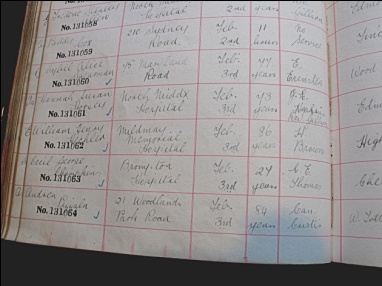
Hechler 131062
David had been a Hechler scholar. He suggested that we look in New Southgate Cemetery in North London. I immediately contacted Gordon and sent him off to New Southgate. Ironically, it was only a seven minute drive from where he lived. Consulting the records, the cemetery administrator took Gordon to an older section of the cemetery. Next to a World War II soldier’s grave was an area that partially overgrown with brambles, tree limbs and shrubs. She told Gordon that was Hechler’s grave. There was nothing there. There was nothing to acknowledge the gentle minister who had spent his life as a staunch opponent of anti-Semitism, a pacifist, a proponent of Zionism and the Jewish people. Gordon reported back.
Traveling to London, I met with the cemetery administrator. We photographed the records of the burial and discovered that an attempt had been made in 1986 by Christians to mark Hechler’s gravesite. For unknown reasons the Christian community did not follow through.
Walking out to the gravesite and standing next to an undistinguished patch of earth an understanding of obligation and failed duty cried out. Before me was the resting place of a man, without whom Zionism and Israel might never have come into being. Before me was the resting place of a man that was owed something much better.
Returning to Jerusalem, I met with Rev. Pileggi and reported on what I had learned. I told him of my resolution to mark the gravesite, even if it would be only Gordon and myself standing there, it was out duty. David agreed but broadened the goal to try and bring Christians and Jews together in common recognition and honor of Rev. Hechler. I knew from the seven year bitter struggle I had with the sclerotic Zionist movement, mired in post-Zionist frustration, to bring Captain Stephen Norman, Herzl’s last descendent and only Zionist in his family, home for reburial on Mt. Herzl that getting the Jews involved would be a major effort.
And it was with one significant exception.
The American Zionist organizations were not interested. The British Zionist movement was very reticent as they faced directly and every day the reality of growing, significant British anti-Semitism disguised as anti-Zionism. Utilizing my contacts from the Stephen Norman project with the Israeli government, returning again to Jerusalem, I met with Chairman Avram Duvdevani and his co-Chairman – David Breakstone of the World Zionist Organization. Their support was unequivocal. David Breakstone agreed to come to the dedication of a memorial stone, if I could put the project together. I next used my contacts through the Israeli Foreign Ministry to gain access to Ambassador Ron Prosor in London and another trip to the U.K.
My contacts in the International Christian Embassy in Jerusalem, the only embassy that has not abandoned the Jewish people’s claim to Jerusalem as the Jewish capital and remains there today, connected me to key organizational Christian counterparts in London. I went to see them.
Slowly, but steadily the pieces began falling into place for not just a memorial stone dedication but an international, Christian and Jew, joint Zionist historical program of honor and remembrance. After the stone dedication a symposium about Hechler’s life would be held at a local church. A date was set for the program, January 30, 2011. It was the 80th anniversary of Hechler’s death. The Christians asked that the date be changed to Monday the 31st instead. They were sensitive to the European Jewish memorial services being held for the equivalent of Yom HaShoah – when Auschwitz was liberated. Sunday the 30th would have been the proper date but the Christians did not want to interfere or upstage any Holocaust memorial programming. They would remember Hechler the next day instead.
It was ironic that the Christian community wanted to be sure and not conflict with the proper memorialization of the Holocaust. Hechler, before he died, had warned the Jewish world of a major catastrophe that was coming if they did not complete Herzl’s vision and return to Palestine. Hechler was snubbed as a crazy old man by the Jews. His Cassandra calls were ignored and even scorned.
Sensitivity for the Jewish needs by the Christian community extended to the ordering of strictly kosher food for the symposium. It was served on paper plates, plastic utensils. They even purchased new water heaters for the instant coffee and teas that were served.
January 31, 2011 opened to warm, beautiful blue skies. The rains had stopped days earlier, permitting the ground to dry out. Film crews appeared, media, newspapers people, TV, as Christian and Jew gathered together at Hechler’s gravesite to dedicate the modest but proper tombstone I had selected for Reverend Hechler. The text carved into the dark grey stone was in gold. It had been jointly composed by Christian and Jew. It read under a large gold Cross –
“When The Lord Shall Build Up Zion,
He Shall Appear in His Glory, 102:16
Reverend William Henry Hechler
1-10-1845 “ 30-1-1931
A Lover of God, His Word and His Ancient People
Tireless Adversary of Anti-Semitism
Friend and Counselor of Theodor Herzl
Has God Rejected His People?
By No Means! Romans 11:1
Repeatedly, I was warned and warned again about security. The program was by invitation only.
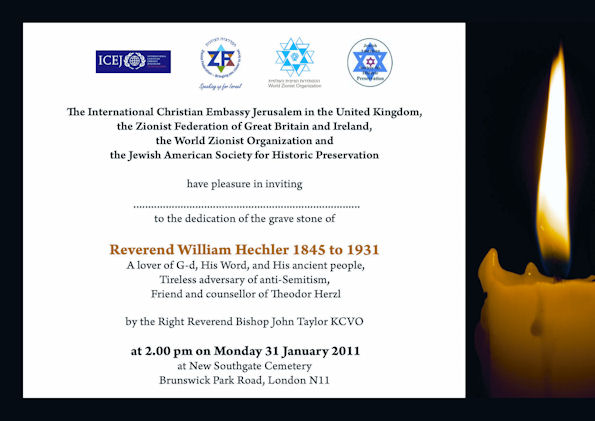
Hechler Invitation
My American naiveté could not quite comprehend that a group of Christians and Jews dedicating a tombstone would be terror targets. But with the heads of 23 Christian Zionist Organizations, the Zionist Federation of Great Britain and Ireland, the World Zionist Organization, the Knesset Christian Allies Caucus, the International Christian Embassy in Jerusalem, the Association of Jewish Ex-Servicemen and Women of the U.K., representatives from the Israeli Embassy, international participants from Europe, all over the U.K., Israel, the U.S., Christians and Jews, even distant members of British Royalty – we would have been an interesting target. God must have watched over us, nothing happened. It did not hurt when the two Israeli diplomats arrived, five people got out of the car. Three Israelis promptly disappeared into the crowd. I was sure they were not there as tourists.
What had started out as a simple stone dedication, with my mistaken fear would be my cousin Gordon and myself alone attending, turned into something much bigger.
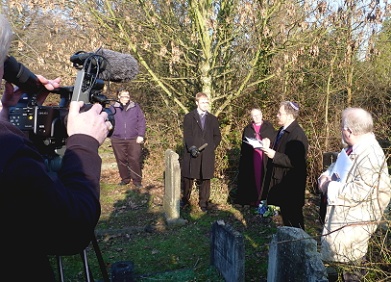 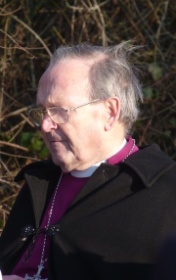
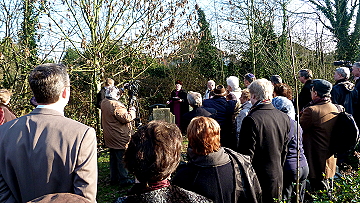
Bishop John Taylor guided the scores and scores of people assembled in the memorial program and service.
A letter from Ambassador Ron Prosor was read as the cameras rolled:
“I am delighted to send my warmest wishes on the occasion of the dedication of Reverend William Hechler’s gravestone.
Britain and Israel enjoyed a friendship long before the establishment of the State of Israel, as a result of the committed efforts of British Christian Zionists. Marking Reverend Hechler’s prominent place in the rich tradition of Christian Zionism in Britain, on the eightieth anniversary of his passing, is especially timely.
The support he gave to Theodor Herzl is symbolic of the understanding that is found today
among our Christian friends, of the eternal connection that exists between the Jewish People and
Eretz Yisrael.
The People of Israel deeply value your solidarity. You are friends who stand with us as we face
the challenges of the future, who share with us a love of the Holy Land, and who lend your
principled and unwavering support.
I commend the work of all of the organisations involved in this important act of remembrance.
Shalom Aleichem – may Reverend Hechler’s memory be blessed.”
David Breakstone, co-Chairman of the World Zionist Organization, spoke.
“Particularly in this age, when the very legitimacy of a Jewish state is being attacked by so many, it behooves us more than ever to acknowledge the faith and allegiance of our non-Jewish friends whose support has proven to be unequivocal,” Breakstone said.
“The ceremony was an inspiring event that demonstrated the fast friendship and commonality of purpose between us all,” he added. “It was also an event of which Herzl would have been proud, giving expression as it did to our common humanity that was so fundamental to Herzl’s worldview.
“In his utopian novel Old-New Land, the visionary of the Jewish state has one of its leaders stating, ‘My associates and I make no distinctions between one man and another.
We do not ask to what race or religion a man belongs. If he is a man, that is enough for us,’” he said.
The proper recognition of Reverend William Henry Hechler was a long overdue Zionist obligation. We had fulfilled our duty to Theodor Herzl. It did not mark an end to recognizing the commonality of good people, Christians and Jews coming together in common purpose for our, different, but mutual interests. It was another door that opened for Christian and Jewish understanding. It is up to us to continue the work that Reverend William Henry Hechler and Theodor Herzl began together so long ago. They looked to the future and we all did as well.
Jerry Klinger is President of the Jewish American Society for Historic Preservation www.Jashp.org
Jashp1@msn.com
~~~~~~~
from the April 2011 Passover Edition of the Jewish Magazine
|
